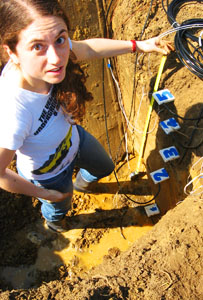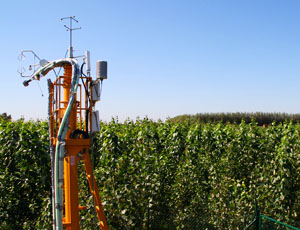Project Info
GHG POPFULL = International Re-integration Grant (IRG) with grant agreement n° 268257 / A Marie Curie Action under the European Commission's Seventh Framework Programme (FP7/2007-2013)

Dr. Donatella ZONA was the key researcher on the Marie Curie Re-integration Grant at the University of Antwerp (Belgium) from 2010-2012. Her present affiliation is the Department of Animal and Plant Sciences at the University of Sheffield.
Address:
The University of Sheffield
Department of Animal and Plant Sciences
Western Bank
Sheffield S10 2TN
United Kingdom
E‑mail: d.zona@sheffield.ac.uk
Prof. Reinhart CEULEMANS was the Project Coordinator of GHG POPFULL. He can be contacted at:
Address:
University of Antwerp
Department of Biology
Research Group of Plant & Vegetation Ecology (PLECO)
Universiteitsplein 1
B-2610 Wilrijk
Belgium
Phone: +32-3-265.2256
E‑mail: Reinhart.Ceulemans@uantwerpen.be
Project Description

The GHG POPFULL project is of major relevance for both scientific and practical reasons. In fact, before pursuing the use of poplar plantations for carbon sequestration and fossil fuel replacement, it is necessary to accurately assess their uptake/release of all major greenhouse gases. It is also seminal to analyze the effect of other greenhouse gases, such as ozone, on the productivity and on the gas exchange of these plantations. Ozone forms in the troposphere when nitrogen oxides (NOx), carbon monoxide (CO), and volatile organic compounds (VOCs), the ozone precursors, react in the presence of sunlight. Motor vehicles exhaust, industrial emissions, and chemical solvents are the major anthropogenic sources of these precursors. These gases are highly concentrated in several areas of the developing world. Poplar is sensitive to ozone damage which decreases CO2 uptake and limits the advantage of the use of this plant species for carbon sequestration. The effect of O3 on other non-CO2 greenhouse gas emissions from a poplar plantation is unknown.
The research performed in GHG POPFULL was the first study to perform such a complete and detailed analysis. Overall, the investigation of CO2, H2O, CH4, N2O exchange and of the environmental variables (water table, soil moisture, precipitation, air and soil temperature, etc.) in the poplar POPFULL plantation provides a more comprehensive and accurate assessment of the environmental controls of the major greenhouse gases emissions and their sensitivity to climate change. This knowledge undoubtedly plays a major role in future policies for carbon sequestration adopted by governments nationally and internationally.
The bio-energy plantation has been established in 2010 and is being maintained for 4 years during which greenhouse gas exchanges are being measured. At the end of the second rotation cycle (2014), the entire plantation is harvested and the total biomass production and energy accounting are quantified by several researchers of the PLECO-team. The biomass calculation is integrated with the greenhouse gas budget derived from the gas flux measurements performed in GHG POPFULL. This will allow estimating a complete budget of the carbon sequestration potential of the SRC and its potential for energy production.
The researcher benefiting from this Marie Curie grant - Dr . Donatella Zona - was actively involved in installing and maintaining the instruments, and in performing the data analysis of the CO2, H2O, CH4, N2O, and O3 fluxes. She interpreted the data and is writing scientific papers on this part of the project. She was directly in charge of:
- Assessing the full greenhouse gas balance of the SRC culture of fast-growing poplars (through measurements of CO2, H2O, CH4, N2O, and O3 fluxes) to quantify the potential of poplar plantations to be used for carbon sequestration.
- Investigating the environmental controls on the emissions and the interactions among the most important greenhouse gases (CO2, H2O, CH4, N2O, and O3).
- Analyzing the effect of O3 on the emission/uptake of CO2, H2O, CH4, and N2O from the poplar plantation.
The work of the GHG POPFULL researcher was carried out in close collaboration with several researchers who estimate the economic and environmental impacts of establishing, maintaining, and harvesting the plantation for energy production (through a Life-Cycle Analysis). The integration of these components provides an accurate way to determine the environmental and economic effectiveness of the plantation for greenhouse gas reduction and energy production.
In conclusion, the exhaustive investigation of GHG POPFULL provides extremely valuable information about the complexity of the mechanisms responsible for the emission/uptake of the most important greenhouse gases (CO2, H2O, CH4, N2O, O3), and their environmental controls, never investigated so comprehensively before.

